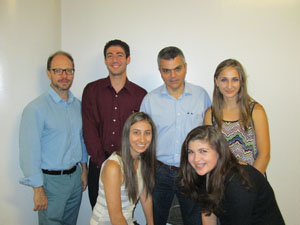Suren Oganessian
Staff Writer

Can Armenia one day finally live in peace with its neighbor to the west? Historian Ara Sarafian would answer with an emphatic “yes,” even while people on both sides of the long-simmering ethnic strife in the region might initially express doubt.
Director of the Gomidas Institute in London, Sarafian delivered the first lecture of the Armenian Studies Program Fall Lecture Series at Fresno State on Thursday, September 5, discussing his experiences while traveling to the city of Bitlis, Turkey and working with the Kurds living there.
The Gomidas Institute is comprised of a network of scholars in Armenian Studies, and has published over 80 books. The Institute is one of the few Armenian organizations actively engaging the citizens of Turkey. They have organized conferences in Istanbul on Armenian issues, and even organized an Armenian Genocide commemoration in the majority Kurdish-populated city of Diyarbakir this year, which was also attended by around 200 Armenian converts, who up until recent years would have been too afraid to openly reveal their ethnic identity.
In Sarafian’s experience, conditions have changed a lot in Turkey in recent years. In becoming more democratic, the tide in Turkish society is gradually shifting away from nationalism and intolerance, and fewer of its citizens are buying into the Turkish government’s version of what happened in 1915. At the forefront of this change is the Kurdish minority, roughly 20 percent of Turkey’s total population.
Sarafian noted that in his travels to Bitlis, a city just west of Lake Van that the Armenians once called Paghesh, not once did he hear anyone deny the Armenian Genocide. On the contrary—the memory of the Genocide is still very fresh in the minds of the Kurds, and they are willing to discuss it, even though many of their own grandparents and great-grandparents participated in it. Locals would point out to Sarafian sites where massacres took place and where mass graves were located. And all of them showed remorse for what had taken place. Up until very recently Kurds were heavily discriminated against in Turkey. This played a large role in the Kurds in Turkey today feeling more sympathy for the Armenians.
With the Turkish government slowly softening its policies, Sarafian and the Gomidas Institute saw opportunity. First and foremost a peace activist, Ara Sarafian’s goal was to begin to build a cultural bridge between Armenia’s and Turkey’s citizens. When presenting himself as a peace activist, not someone looking for compensation for past crimes, Sarafian found that there were many in Turkey willing to listen to him. The city of Bitlis sponsored his initial stay in the city, where he put together a conference with city officials on how best to finally make peace with the Armenians.
Sarafian presented his own research on the Genocide at the lecture at Fresno State; a census conducted by the Armenian Apostolic Church in 1913 showing the Armenian population in the Ottoman Empire, smuggled out of the country in 1919 to avoid destruction, as well as an official Ottoman census from 1905. These statistics were based on Russian and Ottoman sources.
Sarafian said that he was met with silence from Turkey’s official historians when he offered clear solid proof that Armenians had lived in the area or that Ottoman Turkish sources demonstrated the Armenian Genocide thesis—with none of them even responding to his invitations to attend his historical conferences, but he maintains that it is possible for Armenians to make their own alliances within Turkey outside of its denialist government.
“Armenians need to engage the progressive element in Turkey,” Sarafian said, “You can make a powerful argument against the official historians, and people will listen.”
Sarafian predicts that as liberal sentiment grows stronger in the country, eventually the government will be pressured into acknowledging the Armenian Genocide and coming to terms with it. And the way to do this is to start from the bottom up; as long as the Kurds remain receptive, there is hope.
While at face value things such as the reopening of the church at Aghtamar may seem like simple public relations moves that the Turkish government only put together to save face, Sarafian says that those are opportunities Armenians should seize and take advantage of. The way to get the Genocide recognized by Turkey may only be through starting a peaceful dialog. And if Turkey can stop denying the Genocide and instead rejuvenate Armenian culture for the converted Armenians still in the area, maybe Western Armenia “isn’t as lost as we think it is,” as Sarafian astutely put it.
 Hye Sharzhoom Armenian Action
Hye Sharzhoom Armenian Action